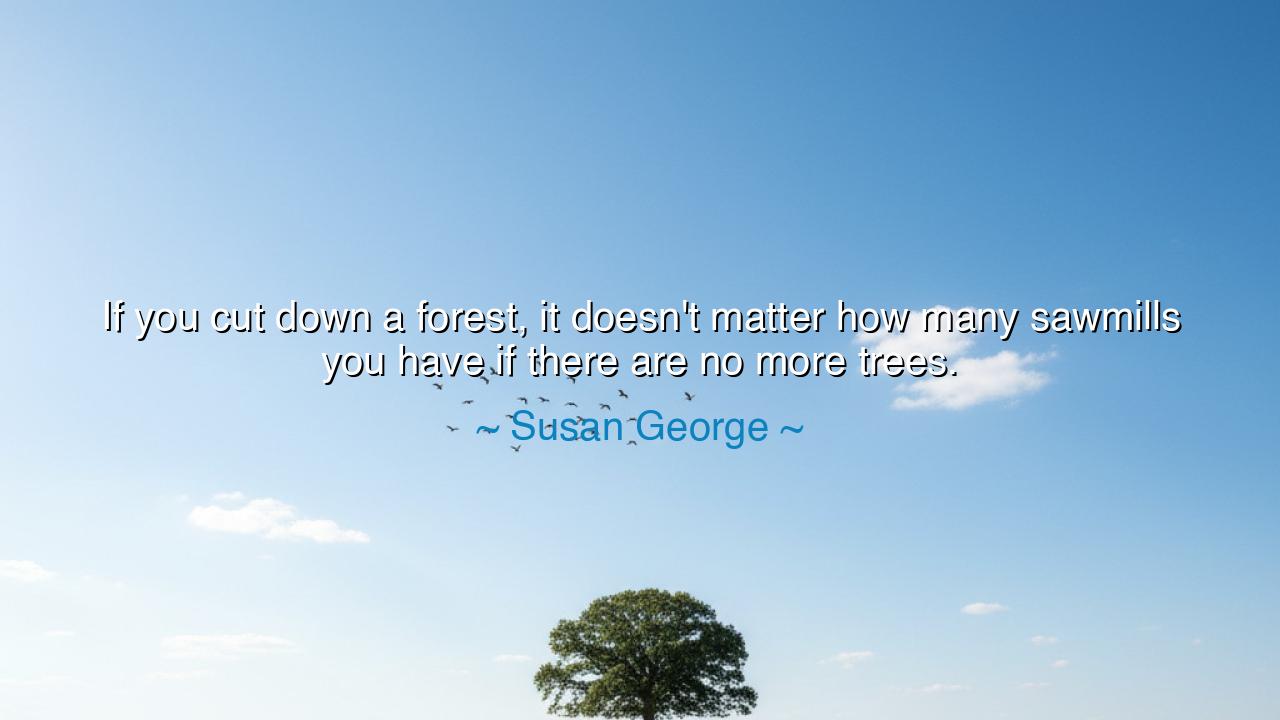
If you cut down a forest, it doesn't matter how many sawmills you
If you cut down a forest, it doesn't matter how many sawmills you have if there are no more trees.






In the annals of wisdom, there are truths so simple that they strike the heart like thunder. Among them stands the teaching of Susan George, who warned humanity with words both plain and profound: “If you cut down a forest, it doesn’t matter how many sawmills you have if there are no more trees.” In her voice we hear not merely the cry of an environmentalist, but the lament of the Earth itself — a mother wounded by the blindness of her children. Her words echo like the warnings of ancient prophets, speaking to an age drunk on progress, yet forgetful of the roots from which all life springs.
This quote, in its surface meaning, is about deforestation — about the folly of destroying the source of what sustains us. But beneath its bark lies a deeper truth: it is a lesson in balance, humility, and foresight. For what is a sawmill without a forest? What is industry without nature? What is progress without preservation? George reminds us that prosperity built on depletion is an illusion, a fleeting mirage that vanishes the moment the last tree falls, the last river runs dry, the last field turns to dust. Her warning is a mirror held up to modern civilization — a civilization that builds faster than it heals, consumes faster than it grows, and measures success by profit rather than permanence.
The origin of her thought lies in the age of environmental awakening, when humanity began to sense the shadow of its own destruction looming across the Earth. Susan George, a scholar and activist, saw how economic greed cloaked itself in the language of development. She saw nations cut down their forests to build wealth, only to find themselves impoverished when the soil eroded and the rain ceased to fall. In her time, tropical forests vanished at the rate of millions of acres each year, sacrificed to the hunger of sawmills, factories, and farmlands that forgot their own dependence on the living green. Her words were not just a plea for trees — they were a call to wisdom, to see the sacred chain that binds all things.
History itself offers a parable. Consider the fate of Easter Island, a once-thriving civilization isolated in the vast Pacific. Its people carved great stone giants — monuments to their ambition and ingenuity — yet they felled every tree on their island to transport them. Without trees, the soil washed away, the crops failed, and the birds vanished. The mighty builders of statues were left with nothing but stone and hunger. Thus, they learned too late what Susan George would remind us centuries later: that when we destroy our foundation, no amount of tools or labor can rebuild it. No sawmill can make a tree grow again once the forest is gone.
This is not only a lesson of ecology but of life itself. In every realm — in nature, in economy, in spirit — there are roots that must be preserved. A family that neglects love, a nation that forgets justice, a generation that forsakes wisdom — all stand as barren as a forest turned to stumps. To cultivate greatness, one must first nurture the ground from which it grows. The ancients knew this truth when they offered prayers to the trees and the rivers before taking from them, for they understood the sacred balance between use and respect.
To the generations that come, hear this teaching: do not measure your wealth by what you extract, but by what you sustain. Plant more than you take. Build only what the Earth can bear. Learn again to see the forest not as timber, but as life itself — as the breath of the world, the guardian of rain and soil, the dwelling place of the unseen. Every seed you plant is a prayer for the future; every tree you save is a promise kept to those not yet born.
Thus, the lesson of Susan George is both humble and mighty: wisdom lies in preservation. The tools of man are nothing without the gifts of nature. A wise people do not ask, “How much can we take?” but rather, “How long can we live?” To live in harmony with the Earth is not weakness — it is the highest form of strength, for it ensures that both forest and future endure. Therefore, plant trees where there are none, protect those that still stand, and remember — the forest is not merely the wealth of the land; it is the soul of humankind.






AAdministratorAdministrator
Welcome, honored guests. Please leave a comment, we will respond soon